Kathmandu Class 9 Extra Questions and Answers CBSE English Chapter 10 NCERT Beehive– Extract Based Questions MCQs Short Answer Questions Long Answer Questions and Value Based Questions
KATHMANDU
(Extra Questions)
Extract Based Questions
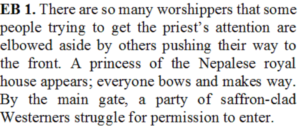

(i) Where is the narrator?
(ii) For whom the way was made by the crowd?
(iii) Name the colour of dress worn by Westerners?
(iv) Which word as used in the extract is synonym of ‘comes’?
(v) Which word in the extract is antonym of ‘exit’?
(vi) Name the author of above extract?
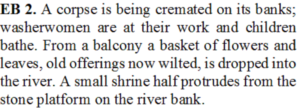

(i) ‘A corpse is being cremated on its bank’. Name the river to which the word ‘its’ refer to?
(ii) Who are taking bath at the bank of the river?
(iii) What is thrown into the river?
(iv) What extends from the stone platform?
(v) Which word as used in the extract is antonym of ‘fresh’?
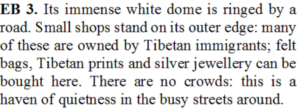

(i) ‘Its immense white ….? To what does the word ‘its’ refer to?
(ii) Who owns most of the shops?
(iii) What prevails in the busy streets?
(iv) Write name of the lesson from which the above extract is taken?
(v) Please write the one word used in the extract for ‘surrounded’?
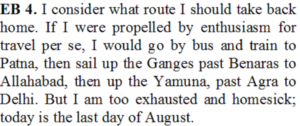

(i) How many cities have been named in above extract?
(ii) How many rivers have been named in above extract?
(iii) From above narration, which city is likely to be hometown of narrator?
(iv) Please write the date (without year) on which above narration is written?
(v) Which word in the extract mean ‘tired’?
(vi) Which phrase in the extract mean ‘by itself’?
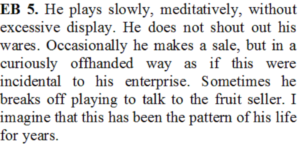

(i) What is ‘he’ selling?
(ii) How often ‘he’ makes a sale?
(iii) Which phrase in the extract mean ‘stops’?
(iv) To whom does ‘he’ talk?
(v) Which word in the extract is synonym of ‘business’?
(vi) Which word in the extract is synonym of ‘think’?
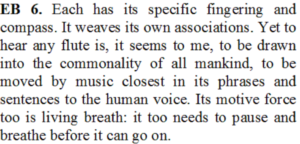

(i) What two things weave its own association?
(ii) How can one be drawn into the commonalities of mankind?
(iii) What does the author mean by ‘living breath’?
(iv) What does a flute player need to do before going on to play flute?
(v) Which word in the extract mean ‘stop’?
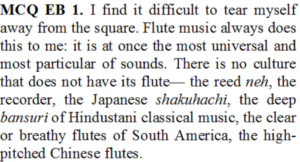

(i) Where is the narrator standing?
(a) at the lobby of his hotel
(b) at the square of the town
(c) at the courtyard of his house
(d) None of above
(ii) Which flute has a high-pitched sound?
(a) recorder
(b) Hindustani
(c) South American
(d) Chinese
(iii) Which culture does not have its flute?
(a) Hindustani
(b) South American
(c) Chinese
(d) All cultures have their flute
(iv) Based on the extract please classify following as fact and opinion
1. Narrator finds it difficult to move away from square
2. Narrator thinks all cultures have their flute
3. China should invent a new flute
4. South American people might like all types of flutes
(a) F -1,2 and O -3,4
(b) F- 1,4 and O- 2,3
(c) F – 2,3 and O – 1,4
(d) F – 1,3 and O – 2,4
(v) Which of the following word has not been used as a verb in above extract?
(a) tear
(b) have
(c) does
(d) clear
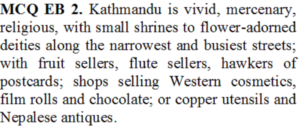

(i) The deities are decorated with
(a) ornaments
(b) flowers
(c) diamond
(d) Both (b) and (c)
(ii) The streets of Kathmandu are-
(a) narrow
(b) busy
(c) either (a) or (b)
(d) both (a) and (b)
(iii) Antiques being sold belong to which country?
(a) India
(b) China
(c) France
(d) Nepal
(iv) Who is selling postcards?
(a) fruit seller
(b) flute sellers
(c) shops
(d) hawkers
(v) Which of the following is related to ‘make up’?
(a) vivid
(b) film rolls
(c) cosmetics
(d) shrines
Short Answer Questions (30-40 words)








Hence he did not allow Westerners to enter the temple.












Answer: Initially the author thought of taking a bus or train to Patna. From there he thought of sailing in Ganges and Yamuna rivers via various town to Delhi.
But he was very tired and feeling homesick. So he bought an air ticket to travel by air.


The other hawker shout a lot about their ware to make a sale.
Long Answer questions (100-120 words)


In one of his hands he is holding a big pole with an attachment at the top. About 50 or 60 flutes are tied to that attachment. These looks likes quills of a porcupine.
He plays a flute for some minutes. The sound of the flute rises above the noise of traffic and the shouts of hawkers.
He plays flute slowly as if he is meditating or praying. He does not shout about what he intends to sell. But strangely he is very cool. Sometimes he stops playing the flute. He talks to fruit seller. Author thinks that since years this is how he has been doing his business.
****
A Slumber Did My Spirit Seal
(Extra Questions)
Extract Based Questions
EB 1.


(i) To whom does the word ‘she’ refer to?
(ii) What sealed the spirit of the poet?
(iii) What does ‘earthly years’ signify?
(iv) What could ‘she’ not feel?
EB 2.


(i) What two things ‘she’ cannot do now?
(ii) What two things ‘she’ does not have now?
(iii) What is meant by ‘diurnal course’?
(iv) What is the poetic device in third line of the extract?
(v) What is the poetic device in fourth line of the extract?
Short Answer Questions (30-40 words)


Such thoughts caused a deep slumber and poet could not understand that time change everything.






****


0 Comments